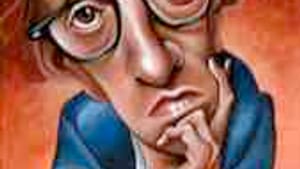Stay in the Loop
BSR publishes on a weekly schedule, with an email newsletter every Wednesday and Thursday morning. There’s no paywall, and subscribing is always free.
Great minds think alike?
My words, echoed by Woody Allen

Once in a blue moon a critic finds his thoughts and words echoed by the very object of his criticism. This deliriously serendipitous experience recently happened to me. My object, of all people, was Woody Allen.
In my review of An Evening Without Woody Allen this past May, you may recall, I chastised 1812 Productions for constructing a theatrical evening out of five of Allen's short stories.
"Woody Allen's stories are meant to be read, not acted," I wrote. "When you read printed pages, you must engage your brain by forming abstract symbols into words and then mind-images. When a Woody Allen essay like A Look at Organized Crime or A Brief Yet Helpful Guide to Civil Disobedience is performed, you're relegated to the role of passive observer. It's sort of like dramatizing Browning's My Last Duchess, or Frost's Stopping By Woods on a Snowy Evening: Some things are best left to the imagination."
As it turns out, Woody Allen himself has now recorded audiobook editions of the four collections of humorous essays he published between 1971 and 2007. That means that you can now listen to Woody Allen reading his stories without having to read them yourself.
That's a mistake, according to my logic above— and as a result of this experience, Allen himself agrees with me. Interviewed in the New York Times (July 21), he had this to say:
"The discovery I made was that any number of stories are really meant to work, and only work, in the mind's ear and hearing them out loud diminishes their effectiveness. Some of course hold up amusingly, but it's no fun hearing a story that's really meant to be read, which brings me to your next question, and that is that there is no substitute for reading, and there never will be. Hearing something aloud is its own experience, but it's hard to beat sitting in bed or in a comfortable chair turning the pages of a book, putting it down, and eagerly awaiting the chance to get back to it."
Thomas Carlyle famously observed that "Every new opinion, at its starting, is precisely in a minority of one." But if that's the case, how did Woody Allen and I arrive at the same conclusion without ever communicating with each other?
Carlyle notwithstanding, this coincidence supports the opposite view: that great ideas often occur simultaneously to many people in isolation. But the ideas perish unless a community connects such people, reinforcing their beliefs and emboldening them to convert their thoughts into actions. (Behind the Jewish requirement of a ten-person minyan for prayer lies the insight that a community of worshippers is greater than the sum of its parts worshipping alone.) Some communities perform this function better than others. And you thought Broad Street Review had no great overarching purpose!♦
To read replies, click here.
In my review of An Evening Without Woody Allen this past May, you may recall, I chastised 1812 Productions for constructing a theatrical evening out of five of Allen's short stories.
"Woody Allen's stories are meant to be read, not acted," I wrote. "When you read printed pages, you must engage your brain by forming abstract symbols into words and then mind-images. When a Woody Allen essay like A Look at Organized Crime or A Brief Yet Helpful Guide to Civil Disobedience is performed, you're relegated to the role of passive observer. It's sort of like dramatizing Browning's My Last Duchess, or Frost's Stopping By Woods on a Snowy Evening: Some things are best left to the imagination."
As it turns out, Woody Allen himself has now recorded audiobook editions of the four collections of humorous essays he published between 1971 and 2007. That means that you can now listen to Woody Allen reading his stories without having to read them yourself.
That's a mistake, according to my logic above— and as a result of this experience, Allen himself agrees with me. Interviewed in the New York Times (July 21), he had this to say:
"The discovery I made was that any number of stories are really meant to work, and only work, in the mind's ear and hearing them out loud diminishes their effectiveness. Some of course hold up amusingly, but it's no fun hearing a story that's really meant to be read, which brings me to your next question, and that is that there is no substitute for reading, and there never will be. Hearing something aloud is its own experience, but it's hard to beat sitting in bed or in a comfortable chair turning the pages of a book, putting it down, and eagerly awaiting the chance to get back to it."
Thomas Carlyle famously observed that "Every new opinion, at its starting, is precisely in a minority of one." But if that's the case, how did Woody Allen and I arrive at the same conclusion without ever communicating with each other?
Carlyle notwithstanding, this coincidence supports the opposite view: that great ideas often occur simultaneously to many people in isolation. But the ideas perish unless a community connects such people, reinforcing their beliefs and emboldening them to convert their thoughts into actions. (Behind the Jewish requirement of a ten-person minyan for prayer lies the insight that a community of worshippers is greater than the sum of its parts worshipping alone.) Some communities perform this function better than others. And you thought Broad Street Review had no great overarching purpose!♦
To read replies, click here.
Sign up for our newsletter
All of the week's new articles, all in one place. Sign up for the free weekly BSR newsletters, and don't miss a conversation.

 Dan Rottenberg
Dan Rottenberg